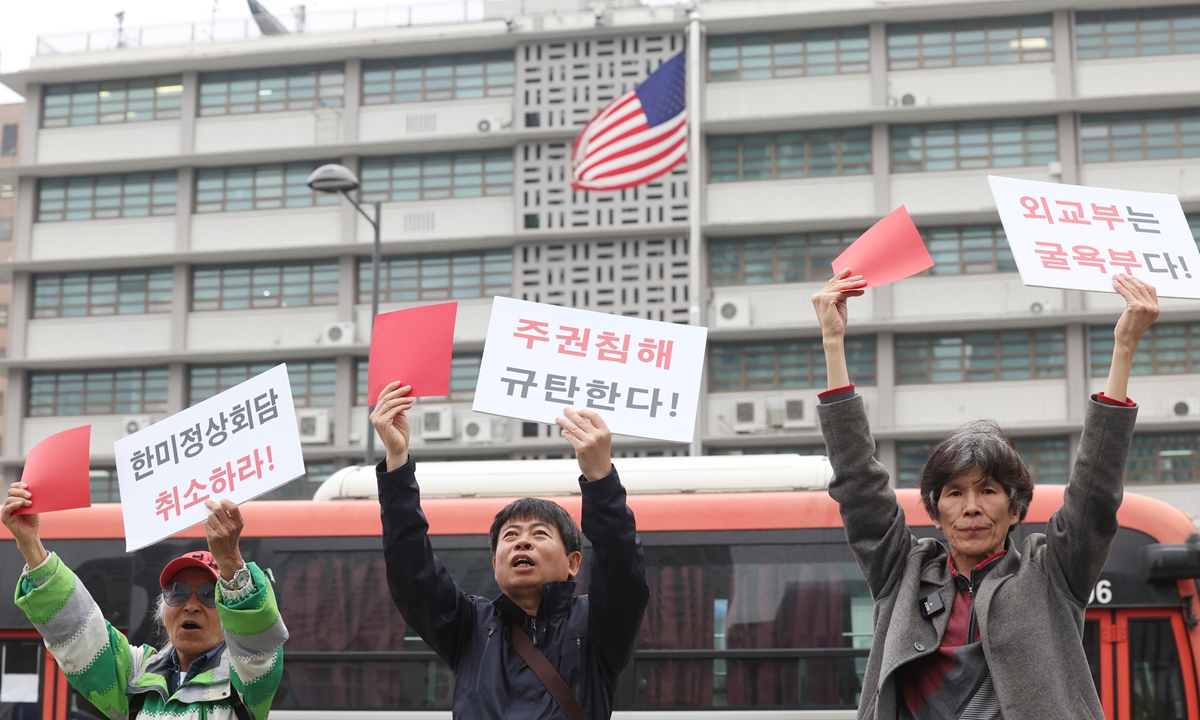
South Korean people protest outside the US Embassy in Seoul on April 11, 2023, after leaked documements show US has been spying on its major allies in Asia. Photo: VCG
Calling the leak of highly classified Pentagon documents "another PRISM incident," Chinese experts on Tuesday said it gives a rare chance to glimpse into how the US spies on its allies, which will exacerbate the lack of strategic mutual trust between them and deal a heavy blow to Washington's strategy of maintaining global hegemony.
A top Pentagon spokesperson said Monday that the leak of the files presents a "very serious" risk to US national security, which has deeply rattled US officials, who fear the revelations could "jeopardize sensitive sources and compromise important foreign relationships," CNN reported.
The classified files first began to appear on Discord in late February, and later spread to other social media sites, including Telegram and Twitter. It was not until The New York Times reported about the material on April 6 that Pentagon chief Lloyd Austin was briefed on the issue.
Pentagon deputy press secretary Sabrina Singh noted on Sunday that the documents circulating on social media sites "appear to contain sensitive and highly classified material."
In addition to highly detailed information that divulge key weaknesses of Ukraine at a critical point on the battlefield - Kiev's much-anticipated "spring counteroffensive," some of the leaked documents are said to have exposed the extent of US eavesdropping on key allies, including South Korea, Israel and Ukraine.
Ukraine has already altered some of its military plans because of the leak, a source close to Ukrainian President Volodymyr Zelensky said.
A senior intelligence official called the leak "a nightmare for the Five Eyes," in a reference to the US, UK, Australia, New Zealand and Canada, the so-called Five Eyes nations that broadly share intelligence, The New York Times reported.
In an attempt to sooth anxious nerves, US State Department spokesperson Vedant Patel on Monday told reporters they are engaging with allies and partners at high levels over the matter, and are working on reassuring them of US' commitment to safeguarding intelligence and "the fidelity" of the partnerships.
Experts said the leak could pose a profound and complicated impact on ties between US and its allies, especially on intelligence and security cooperation.
Yang Xiyu, a senior research fellow at the China Institute of International Studies, told the Global Times on Tuesday that the incident will further add to dissatisfaction with the US among its allies, and most importantly, exacerbate the lack of strategic mutual trust between them.
"While knowing that their security interests are highly tied to that of the US, allies are coming to realize that the relationship with Washington is more of a domination and subordination. To satisfy its own selfish needs, the US is threatening the security of its allies through spying on their intelligence by any means necessary," Yang noted.
Calling the leak "another PRISM incident," Chinese military expert Song Zhongping noted that for one thing, it exposes a huge loophole in America's national security, and for another, it deals a significant blow to US intelligence authorities, which would become a major shortcoming that affects the cooperation with its allies.
"The distrust and disunity spurred by the incident is a heavy blow to the US' strategy of maintaining global hegemony. US hegemony will only decline day by day without the strategic support of its allies," Song told the Global Times.
As the incident sends shockwaves across the White House, National Security Council spokesperson John Kirby said there are concerns there could be additional leaks.
"We don't know who is behind this. We don't know the motive. And we don't know what else is out there," he said, reported VOA.
The leak of classified documents reveals the tearing of different voices and values within the US. Many are dissatisfied with Washington's policy that both harms the interests of its own and the common welfare of countries around the world, and such outrage over the government's abuse of power in overseas and domestic operations has accumulated to a point that eventually led to the leak, Li Haidong, a professor at the China Foreign Affairs University, told the Global Times on Tuesday.




